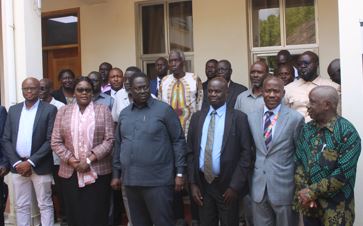The Government of South Sudan on Tuesday launched the cooperative e-registry, a digital platform to streamline registration and management of cooperatives, to promote transparency and efficiency in the sector.
Speaking during the launch of e-registry in Juba, Hussein Abdelbagi Akol, Minister of Agriculture and Food Security, said the move is a significant shift from manual registration to the use of electronic methods.
“Today, we are playing our role of developing and assisting cooperatives. The electronic registration is an innovation in the registration of cooperatives to foster, preserve information on cooperatives, and to know the status of the cooperatives at a glance, and better and foster better communication between any state and the three administrative areas,” he said. “I was very consistent and told them that we should not encourage poor individuals this time. I am going to announce from today that if you do not gather and come as a group, we will have no time to support you. This will be our directive to the country, and we have to encourage the cooperatives and support them.”
For his part, Food and Agriculture Organization Country Representative in South Sudan, Meshak Malo, stressed the need to encourage the younger generation to view agriculture as a viable business venture.
“I was at the university, and they were telling me that agriculture is not sexy, so they do not want to join it. So, now we are going digital and we really want to call on the young people to join us. Come and assist to see how this e-registry works and the capacity it gives,” he said. “We are looking forward to this, and it is going to be a journey. There is a lot, but we have to populate the e-registry. We have to go to the states to make sure that it comes in. Later on, we have to see areas where we have not been perfect.”
Meanwhile, the head of the Cooperative Department at Co-operative Bank of South Sudan, Stephen Almadi, stated that the central registry will make it easier for them to verify cooperatives to partner with to avoid irregularities.
“As Cooperative Bank, cooperatives are our DNA, and so we have a very keen interest to get to know where they are, to know who they are, and to work with them. Currently, we have faced many challenges because of the lack of a central registry. This is because each partner who wants to engage the cooperatives has done their own data collection,” Almadi said. “Each partner comes with their data, and this has a very big effect in terms of lack of coordination. So, when you do not have central data to work with, what you are simply doing is getting a patch of data, and the information that is given to you is not comprehensive. So, we cannot walk the journey together in the development of our cooperatives.”




